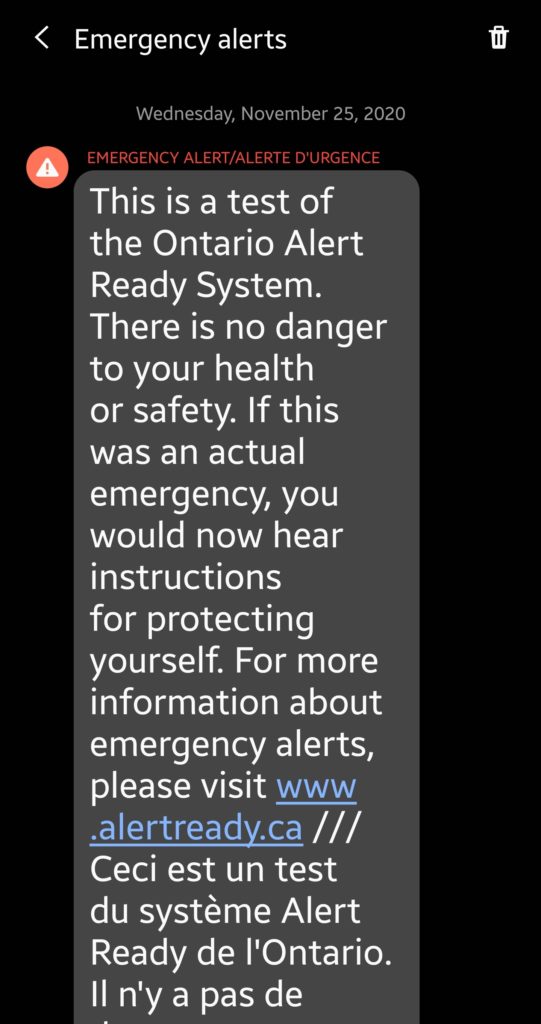The other day, while I was at work, several cell phones went off, blaring the same harsh alert sound.
“Probably an Amber Alert,” I mused, and went about my day, promptly disregarding the disruption.
It wasn’t until after I went to check my own phone during my lunch break did I realize it wasn’t an Amber Alert at all, but a test of the Ontario Emergency Alert System.

A few points to consider here:
- The same alert tone is used for an Amber Alert as it is for a large-scale, province-wide emergency alert. Attention-grabbing? Yes…for a bit. I won’t argue the efficacy of every Ontario resident receiving the alert increasing the likelihood of a missing or abducted child being found safely. That said, when the alarm goes off every time a child goes missing in Ontario (which, I regret to say, is far too often), then one tends to tune them out when you’re at work or asleep in bed at home.
- Suppose the alert wasn’t for a test, but for an actual immediate threat to national security? Heaven forbid, but what if a SCUD missile was on its way to Toronto to inflict nuclear annihilation? I want to emphasize that a missing child is absolutely nothing to be taken lightly. But I also want to impress upon you the fact that the same alert sound is used for two vastly opposite events makes it difficult to react appropriately to either of them.
Now, let me digress before I wrest myself from my actual argument into a conversation I’d rather not engage with on a site about writing.
I bring up this anecdote to illustrate an example where I had become desensitized to an outcome. This made me reflect on an idea: is it bad to be desensitized to danger?
Let’s examine this in the context of writing. Say you’ve created a piece of fiction and wish to have it published. The safe option would be to go the self-publishing route. You can slap it on Amazon and hope to snag a few curious purchases. You may also opt to submit to some fledgling writing sites that don’t compensate contributors but offer to pay in exposure. Again, an easy route that will get your piece published, but may not necessarily be seen by many eyes.
However, if you really want the opportunity for your writing to make an impact, you’ll have to subject yourself to some moments of danger. Things that make your adrenaline rise, your palms sweat, and your heart beat just ever so faster.
To improve your writing, you could share it with a critique group; this may expose you to the danger of receiving negative or critical feedback, but the benefit is you can locate structural weaknesses and address them.
To get your writing in front of a wider audience, you can submit to a site that pays a fee to its writers, or even to a print magazine. But to do that, you would have to subject yourself to the constant threat of danger of rejection, of hearing no an uncomfortable amount of times before finally getting an acceptance with a respected publication.
In other words, to embark on a writing journey, on the path to become a published author, you can’t take the easy, flat, predictable path and expect substantial results. No, dear writer – in order to succeed, you need to take the risk – the danger if you will – of taking the less traveled path. The dark, winding path where the other side is not clearly visible. You have to learn to desensitize yourself to the fear and pain of danger.
Two roads diverged in a wood, and I—
I took the one less traveled by,
And that has made all the difference.
Robert Frost
Do you agree? Is it such a bad thing to be desensitized as a writer? And if you live in Ontario, do you share my thoughts on the Amber Alert/Emergency Alert? I recognize this is a controversial stance to take; if you have any powerful thoughts to impart, please leave them in the comments below.